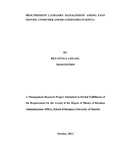| dc.description.abstract | This study sought to establish the benefits associated with implementation a category
management strategy among FMCGs multinationals in Kenya. The environment in
which organizations conducts business is turbulent and gets more competitive by the
day. This leads to shrinking profitability, procurement category management comes
up with innovative activities to create more value and reduce cost to the business.
This improves organization profitability in a sustainable manner.
In this study, FMCGs mmultinationals were considered since they have local
manufacturing operations in Kenya therefore their annual spend on Capital and
Operating expenditure is high. Category management concept is particularly
beneficial to high spend organisations. This study thus sought to determine the extent
of procurement category management adoption and challenges associated with the
successful implementation of category management strategy among FMCGs
multinationals in Kenya.
Primary data for the study was collected from five selected multinationals in Kenya
including East African Breweries, Unilever Kenya, Nestle Foods, GlaxoSmithKline
and British American Tobacco Kenya Limited. Data collection was through a selfadministered
questionnaire and analysis conducted through descriptive means as well
as content analysis. The study showed that all the organizations under study had adopted procurement
category management over the past three to five years. The study found out that the
major benefit associated with category management is sustainable cost savings to the
organization while category management has little effect in the use of technology and
management information as well as improving the optimal procurement operating
model. The greatest challenge in the implementation of category management strategy
is lack of qualified personnel and the high cost of implementation.
The study recommends adoption of category management among companies,
government and government agencies who have not implemented procurement
category management. The study also suggests investment in the right human
resource, development of the correct change management process and appropriate
communication mechanism as the levers to successful implementation of category
management. | en |

